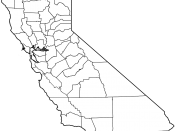"Some people want the medicine man and woman to share their religious belief in the same manner that priests, rabbis, and ministers expound publicly the tenets of their denominations; others feel that Indian ceremonials are remnants of primitive life and should be abandoned." - Vine Deloria (NARF article)
Religious freedom is an autonomy that most people living in the present take for granted. For most it is a right that they have never had to question. For example, if a westerner wants to practice Catholicism, study the "Koran", or even master the art of Zen Buddhism he or she is free to do so without suffering any consequences. This is not true for the American Indian. Religious freedom has become more of a gift given to the Indians from the United States government rather than a birthright. In the last two hundred years, the white mans' desire to assimilate the Indian in to their own culture by refining them through religious persecution can be well noted from the times of the early Spanish settlements all the way through the arrival of the French, English, and ultimately the colonization of the Americans.
All four above mentioned groups, with their own religious beliefs, felt that to educate the Indians upon their "God" was an equitable rationalization for taking Indian land, leading to the absorption of the American Indian into the dominating cultures which surrounded them. As a result of the paternalistic attitudes brought with the European colonizers, the American Indian religions were forced by law into partial extinction. The American Indian Religious Freedom Act of 1978 (A.I.R.F.A.) was created to protect the religious rights of American Indians living under the oppression of western society.
For Indians, religious freedom can be seen as their life-blood. It is not a practice seen as a...


